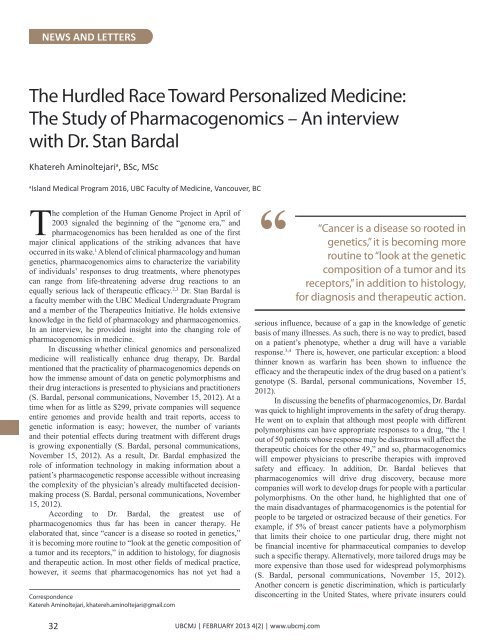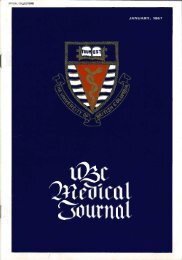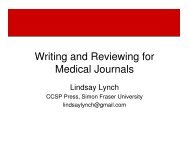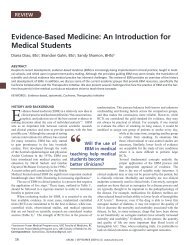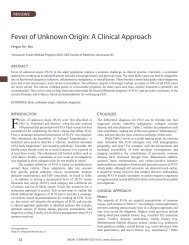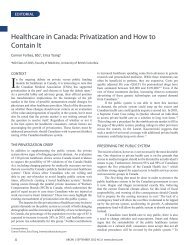Download full PDF - UBC Medical Journal
Download full PDF - UBC Medical Journal
Download full PDF - UBC Medical Journal
You also want an ePaper? Increase the reach of your titles
YUMPU automatically turns print PDFs into web optimized ePapers that Google loves.
NEWS AND LETTERS<br />
The Hurdled Race Toward Personalized Medicine:<br />
The Study of Pharmacogenomics – An interview<br />
with Dr. Stan Bardal<br />
Khatereh Aminoltejari a , BSc, MSc<br />
a<br />
Island <strong>Medical</strong> Program 2016, <strong>UBC</strong> Faculty of Medicine, Vancouver, BC<br />
The completion of the Human Genome Project in April of<br />
2003 signaled the beginning of the “genome era,” and<br />
pharmacogenomics has been heralded as one of the first<br />
major clinical applications of the striking advances that have<br />
occurred in its wake. 1 A blend of clinical pharmacology and human<br />
genetics, pharmacogenomics aims to characterize the variability<br />
of individuals’ responses to drug treatments, where phenotypes<br />
can range from life-threatening adverse drug reactions to an<br />
equally serious lack of therapeutic efficacy. 2,3 Dr. Stan Bardal is<br />
a faculty member with the <strong>UBC</strong> <strong>Medical</strong> Undergraduate Program<br />
and a member of the Therapeutics Initiative. He holds extensive<br />
knowledge in the field of pharmacology and pharmacogenomics.<br />
In an interview, he provided insight into the changing role of<br />
pharmacogenomics in medicine.<br />
In discussing whether clinical genomics and personalized<br />
medicine will realistically enhance drug therapy, Dr. Bardal<br />
mentioned that the practicality of pharmacogenomics depends on<br />
how the immense amount of data on genetic polymorphisms and<br />
their drug interactions is presented to physicians and practitioners<br />
(S. Bardal, personal communications, November 15, 2012). At a<br />
time when for as little as $299, private companies will sequence<br />
entire genomes and provide health and trait reports, access to<br />
genetic information is easy; however, the number of variants<br />
and their potential effects during treatment with different drugs<br />
is growing exponentially (S. Bardal, personal communications,<br />
November 15, 2012). As a result, Dr. Bardal emphasized the<br />
role of information technology in making information about a<br />
patient’s pharmacogenetic response accessible without increasing<br />
the complexity of the physician’s already multifaceted decisionmaking<br />
process (S. Bardal, personal communications, November<br />
15, 2012).<br />
According to Dr. Bardal, the greatest use of<br />
pharmacogenomics thus far has been in cancer therapy. He<br />
elaborated that, since “cancer is a disease so rooted in genetics,”<br />
it is becoming more routine to “look at the genetic composition of<br />
a tumor and its receptors,” in addition to histology, for diagnosis<br />
and therapeutic action. In most other fields of medical practice,<br />
however, it seems that pharmacogenomics has not yet had a<br />
Correspondence<br />
Katereh Aminoltejari, khatereh.aminoltejari@gmail.com<br />
“<br />
“Cancer is a disease so rooted in<br />
genetics,” it is becoming more<br />
routine to “look at the genetic<br />
composition of a tumor and its<br />
receptors,” in addition to histology,<br />
for diagnosis and therapeutic action.<br />
serious influence, because of a gap in the knowledge of genetic<br />
basis of many illnesses. As such, there is no way to predict, based<br />
on a patient’s phenotype, whether a drug will have a variable<br />
response. 3,4 There is, however, one particular exception: a blood<br />
thinner known as warfarin has been shown to influence the<br />
efficacy and the therapeutic index of the drug based on a patient’s<br />
genotype (S. Bardal, personal communications, November 15,<br />
2012).<br />
In discussing the benefits of pharmacogenomics, Dr. Bardal<br />
was quick to highlight improvements in the safety of drug therapy.<br />
He went on to explain that although most people with different<br />
polymorphisms can have appropriate responses to a drug, “the 1<br />
out of 50 patients whose response may be disastrous will affect the<br />
therapeutic choices for the other 49,” and so, pharmacogenomics<br />
will empower physicians to prescribe therapies with improved<br />
safety and efficacy. In addition, Dr. Bardal believes that<br />
pharmacogenomics will drive drug discovery, because more<br />
companies will work to develop drugs for people with a particular<br />
polymorphisms. On the other hand, he highlighted that one of<br />
the main disadvantages of pharmacogenomics is the potential for<br />
people to be targeted or ostracized because of their genetics. For<br />
example, if 5% of breast cancer patients have a polymorphism<br />
that limits their choice to one particular drug, there might not<br />
be financial incentive for pharmaceutical companies to develop<br />
such a specific therapy. Alternatively, more tailored drugs may be<br />
more expensive than those used for widespread polymorphisms<br />
(S. Bardal, personal communications, November 15, 2012).<br />
Another concern is genetic discrimination, which is particularly<br />
disconcerting in the United States, where private insurers could<br />
32<br />
<strong>UBC</strong>MJ | FEBRUARY 2013 4(2) | www.ubcmj.com


